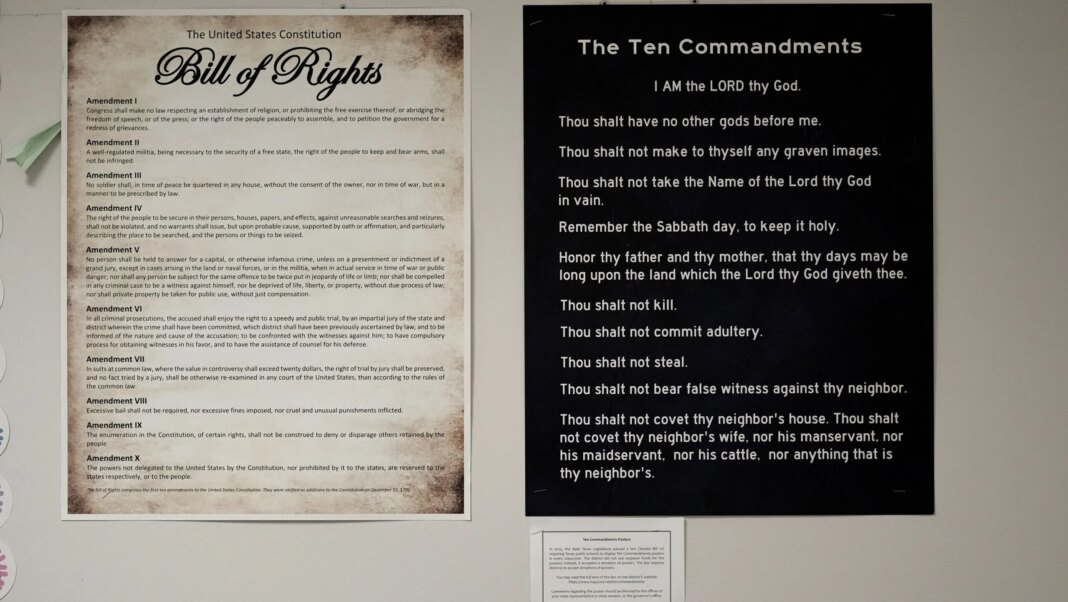A Teacher’s Stand Against the Ten Commandments Mandate
When Gigi Cervantes, a dedicated high school theater teacher, faced a new Texas law mandating the display of the Ten Commandments in classrooms, it shook her to her core. Cervantes felt a profound conflict between her commitment to education and the imposition of religious doctrine on her students, ultimately leading her to resign from a job she cherished.
Cervantes stated, “I just was not going to be a part of forcing or imposing religious doctrine onto my students.” Her decision reflects a growing concern among educators regarding this shift in policy.
The Mandate’s Origins and Implications
Texas is currently undertaking an extensive initiative to post the Ten Commandments in public schools, a move unprecedented in scale compared to other states. This Republican-led mandate, effective from September, has thrust school districts into a challenging ethical landscape. As they grapple with the law’s requirements, many are forced to make difficult choices about their educational philosophies and the rights of their students.
Federal courts have intervened in this debate, ordering over two dozen school districts to hold off on compliance, citing violations of the First Amendment. This backdrop of legal uncertainty raises questions about the future of similar laws in states like Arkansas and Louisiana, further complicating the matter.
The Rollout and Its Challenges
As Texas schools rush to comply, the logistics of implementation reveal a chaotic landscape. Some districts are navigating the mandate by soliciting donations for posters, with unexpected consequences. For example, officials in Frisco, a suburban Dallas district, spent nearly $1,800 to print thousands of posters, despite only needing to hang donated ones. Conversely, other schools lack the posters entirely, demonstrating a mixed approach to this mandated display.
Teachers have expressed a range of perspectives on the matter. While some embrace the poster in the context of history—highlighting the influence of Christianity on American founding principles—others are deeply apprehensive about the broader implications. Eighth-grade history teacher Dustin Parsons noted the educational value but clarified, “I’m not evangelizing.”
Legal and Ethical Dilemmas for School Districts
The law stipulates that the Ten Commandments must be displayed in a “conspicuous place” and visible to anyone with average vision. Districts find themselves caught in a legal and ethical quagmire. The Galveston Independent School District’s board voted against posting the commandments until the courts determine the law’s constitutionality, only to become the target of a lawsuit from Texas Attorney General Ken Paxton. Another district, Leander ISD, maintained compliance by displaying the required posters.
Elizabeth Beeton, a school board member in Galveston, aptly summarized the dilemma facing districts: “They are in between a rock and a hard place.”
Donors and Their Motivations
Supporters of the Ten Commandments mandate view it as a cornerstone of moral guidance in society. Lorne Liechty, an attorney and commissioner in Rockwall County, rallied support to fund the display of posters in his local school district, asserting that these commandments are fundamental to both Christian faith and the legal framework of the United States. He expressed confusion as to why anyone would object to principles he sees as “really good guides for human behavior.”
For some parents, like Adriana Bonilla, the posters represent essential moral teachings. “It assists with moral foundations and it teaches respect and responsibility,” she remarked, highlighting the belief that young students benefit from exposure to these principles.
Teachers’ Concerns and Student Reactions
As the law comes into effect, teachers are grappling with questions on how to manage classroom dynamics. Julie Leahy, from the Texas Classroom Teachers Association, noted that many educators are concerned about potential repercussions for refusing to display the commandments. There’s also uncertainty on whether other religious tenets could be shared alongside the Ten Commandments, adding further complexity to the issue.
Meanwhile, students are engaged in their own debates. For instance, Madison Creed, a 16-year-old high school student from Carthage, shared her experience of lively discussions among peers regarding the appropriateness of the religious law in public schools. While some support the mandate, others, like Johnnie Cotton, a band director who resigned over the issue, advocate for a separation of church and state in educational settings.
Cotton’s departure resonated with students, particularly Creed, who understood his stance. As public schools are not religious institutions, the posting of the commandments raises questions about inclusivity and respect for diverse beliefs.
A Stand for Rights and Principles
Gigi Cervantes’ resignation not only marks a personal decision but reflects a larger movement within the educational community. As she concluded her tenure at the Fort Worth Academy of Fine Arts, her students expressed support for her stance. Cervantes articulated a sentiment of disillusionment with societal pressures, asserting, “I kind of feel like we are living through a time where people… are not standing up, not speaking out.”
Her choice underscores the broader implications of this mandate, raising crucial questions about the intersection of education, religion, and individual rights in public spaces. As debates over the Ten Commandments in schools unfold, the tension between personal conviction and legal obligation continues to shape the narrative in classrooms across Texas.



